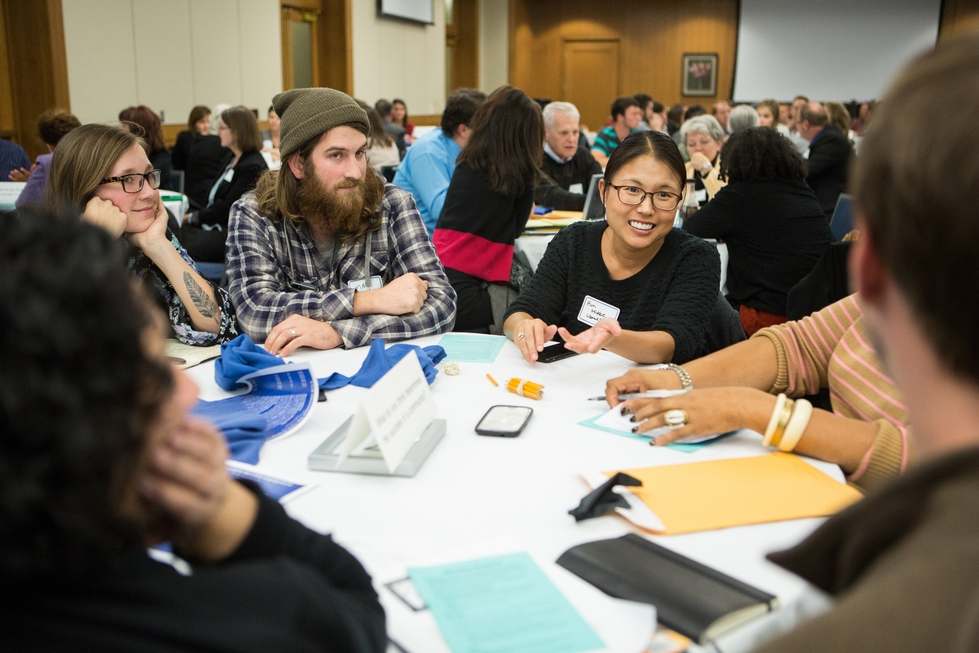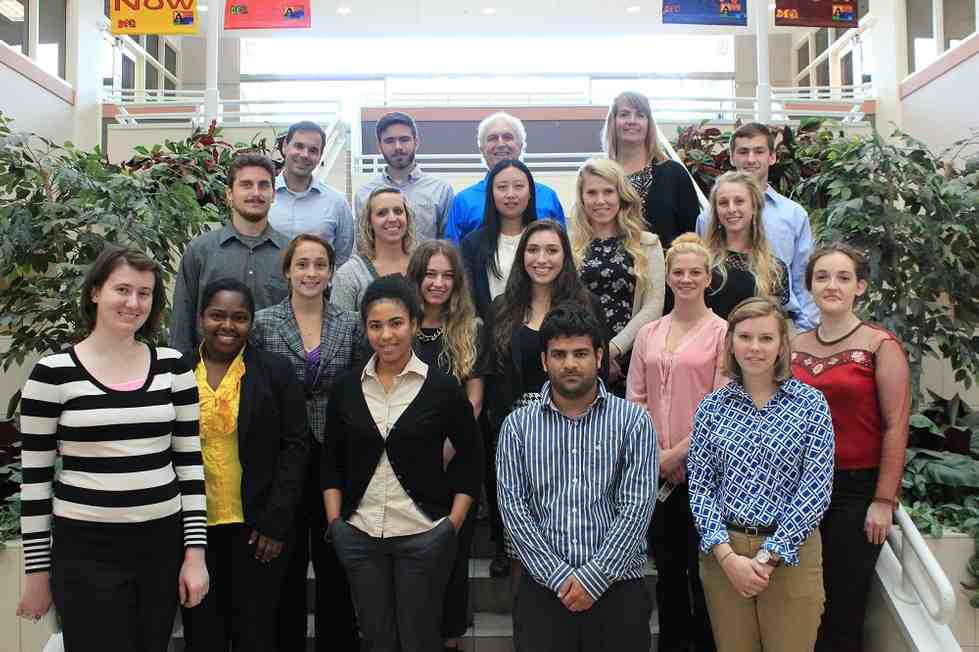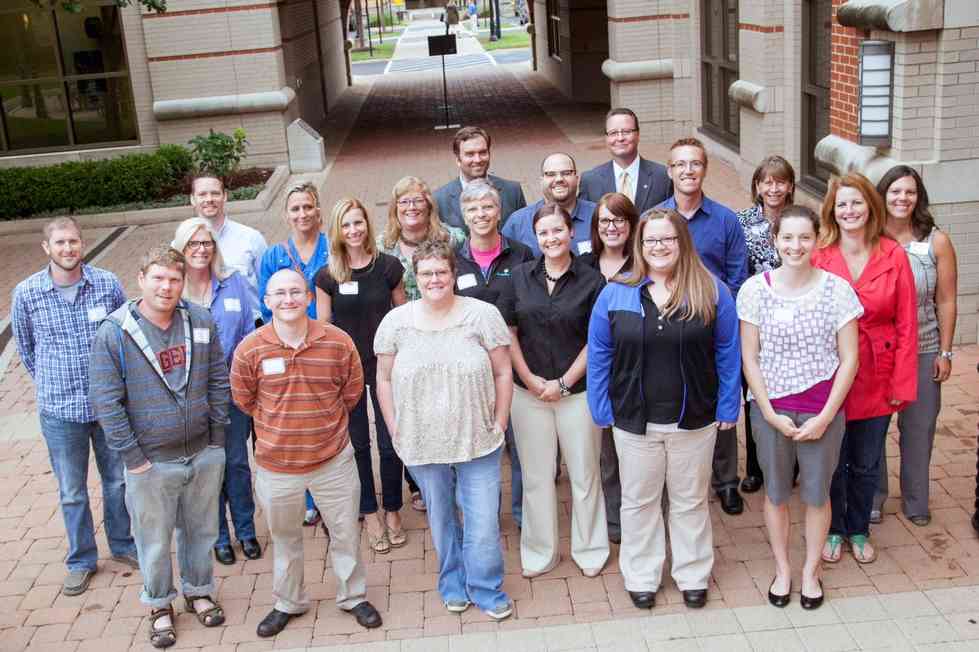Interdisciplinary Innovation
Students Study Civil Discourse by Learning About Detroit
Students who enrolled in the inaugural civil discourse class this past fall had a unique opportunity to meet Detroiters who are working at the grassroots level to revitalize their neighborhoods.
The class, Detroit’s Public Dialogues: Listening Across Differences, Seeing Beyond Stereotypes, Talking Among Communities, was taught by Lisa Perhamus, assistant professor of education, and modeled an innovative pedagogy grounded in community engagement.
Perhamus is the first Padnos/Sarosik Endowed Professor of Civil Discourse, a position established in 2013 thanks to a gift from longtime Grand Valley supporters Shelley Padnos and Carol Sarosik and housed in the Brooks College of Interdisciplinary Studies.
Perhamus designed the course to show students how language and civil discourse are tied to social justice. “I would like the students to see how people use the narratives of their lives to create social justice,” she said.
The course included two days in Detroit, where students spent time with leaders like 100 year-old Grace Lee Boggs, who remains active after seven decades of working for labor and civil rights, and Richard Feldman, labor activist and board member of the James and Grace Lee Boggs Center for Nurturing Community Leadership. Students also toured urban gardens, the Heidelberg Project, and other initiatives created by Detroiters.
Perhamus said it’s important for students to know they are not headed to Michigan’s largest city to rescue it. “We’re partners with the people who are living in Detroit. We will learn from them and learn how people are committed to each other as neighbors,” she said.
Students from the course helped plan the first Padnos/Sarosik Civil Discourse Symposium that took place on November 3, 2014. The theme of the event was Civil Discourse for Civic Engagement. Participants watched the film We Are Not Ghosts and heard from a panel of Detroit community leaders. The students in the course served as table facilitators and led engaging discussions around the question: “What do you think determines the success of a community?”
Perhamus said students were excited to share the work that had been done in class and in Detroit. “They also said that the symposium sparked a sense of responsibility to be socially conscious of being leaders of civil discourse,” she said. Detroit will continue to be the focus of the civil discourse class during the Fall 2015 semester. The students’ work will culminate with a symposium facilitated by students on November 19, 2015, titled East and West Together: Intersections of Reimagining the Future of Michigan.

Brooks Professional Series Connects Students to Alumni and Provides Leadership Opportunities
Our last annual report introduced readers to the Brooks Professional Series (BPS), a co-curricular series of events sponsored by the Office of Integrative Learning and Advising that is designed to help students develop professional skills and connect their academic experiences to employment opportunities.
The idea behind the program is to help students with majors and minors in Brooks College explore how their academic interests prepare them for jobs after graduation, articulate for potential employers the unique skills and abilities they have acquired while at Grand Valley, and build networks of professionals and community members to support them as they launch their careers. Events held throughout the year included site visits to the Grand Rapids Community Foundation and the Michigan Department of Environmental Quality; networking mixers in Grand Rapids, Allendale,Muskegon, Holland, and Traverse City; and a workshop on Developing Your Personal Brand.
This year, the BPS added to its lineup two new components. A mentoring program, which pairs students to Brooks College alumni, has deepened the networking experiences that are a signature of the program. A newly formed Student Executive Committee helped plan events and took an active role in shaping the program, providing an important new leadership and professional development opportunity for Brooks College students that ensures student investment in, and ownership of, the BPS.
By all accounts, the program has been a great success. According to Brian Jbara, director of Integrative Learning and Advising and the creator and facilitator of the program, 256 students attended BPS events throughout the year. Simply by engaging with the events and making new connections with employers and community members, 25 percent of those students received internship and job offers or opportunities to job shadow. Additionally, 30 students who engaged with BPS programming took advantage of the opportunity to connect with a Brooks College alumni mentor.
“I cannot say enough positive things about my experience with the mentoring program,” said women, gender, and sexuality studies major Mackenzie Kibbe. “Through my mentor, I am able to see what someone whose interests are similar to mine is doing postgraduation. Most importantly, however, at a time when I am experiencing a multitude of scary but exciting changes, she has become more than just my mentor — she is also my friend.”
Students who fully participate in three events throughout the year earn a certificate of completion. This year, 12 students completed the certificate requirements and were recognized by faculty and staff members and their peers at an April reception:
- Brenden Cooper, liberal studies major
- Kabine Coulibaly, liberal studies major
- Justin Doan, liberal studies major
- Jaclyn Ermoyan, nonprofit administration major and Frederik Meijer Honors College student
- Kaitlin Gaule, biology major, environmental studies minor
- Logan Knoper, geology major
- Marisol Menken, liberal studies major
- Bernice Mitchell, liberal studies major
- Jacob Schaafsma, liberal studies major
- Emily Smigiel, liberal studies major
- Hannah Swanson, liberal studies major
- Chelsea VanAllsburg, liberal studies major

New Curricular Initiatives in Brooks College Showcase Systems-thinking Approach to Interdisciplinarity
Brooks College strives to develop new learning opportunities for students that prepare them for the increasingly interdisciplinary nature of career paths and civic needs.
This year, several new courses launched that build upon the expertise of faculty members across Brooks College programs and offer students new opportunities to integrate perspectives
from the sciences, social sciences, and humanities. Danielle Lake, assistant professor of liberal studies and the faculty member who developed two new courses, Wicked Problems of Sustainability and Design Thinking to Meet Real World Needs, said these classes prepare students to work on systemic issues by applying their knowledge and to learning by-doing in collaboration with fellow students, community members, and stakeholders.
“Each of these courses helps students to develop epistemic humility, creative confidence, and a stance of open-minded advocacy,” Lake said.
Here is a sampling of new curricular offerings in Brooks College:
Food Matters (LIB 342)
This course offers students an interdisciplinary exploration of the relationship between global food production and distribution systems and the food that they consume on a daily basis. The course integrates a wide range of food related topics from nutrition to agricultural production to the cultural aspects of food. Students critically analyze competing information about food and nutrition in our culture, and they gain an understanding of the evolutionary, historical, sociopolitical, cultural, and environmental factors shaping our current food systems and the impacts of those systems on nutrition, food justice, and agricultural practices.
In addition to counting as a course in the sustainable foods systems certificate, it serves as a general education Issues course targeted at juniors and seniors in any major; as such, students work in interdisciplinary teams to explore problems related to food systems.
Wicked Problems of Sustainability (LIB 322)
Also a general education Issues course open to any junior or senior at Grand Valley, this class engages students in participatory research on the three pillars of sustainability:environmental, economic, and social justice impact. A problem is “wicked” if it is complex, multifaceted, and not easily solved; sustainability, as a wicked problem, is an intractable, on-going, and high-stakes issue. Students in this course work with community partners to explore in an interdisciplinary fashion the complicated nature of problems related to sustainability, such as urban food
deserts, alternative energy technologies, and sustainable city planning and development.
Design Thinking to Meet Real World Needs (LIB 323)
At the start of the 2014-2015 academic year, Grand Valley announced its Design Thinking Initiative with the goal of ensuring students will be prepared for lifelong learning and careers in ever-changing work environments. The first course to emerge from this university-wide initiative will launch in Fall 2015, with Lake and Linda Chamberlain, the new Meijer Endowed Honors Chair in Entrepreneurship and Innovation in the Frederik Meijer Honors College, team-teaching the course.
Students will learn the theory and process behind design thinking as a method for devising products, services, or programming that advances a social good and are sustainable. Another general education Issues course that is open to juniors and seniors of any major, this course will be taught at the Robert C. Pew Grand Rapids Campus to ensure students in the professional colleges can enroll. Students will work in interdisciplinary teams to brainstorm and produce a prototype of a product, program, or service that solves a real-world problem or meets a real-world need.
“This course will help students develop the skill sets and tools that are essential for tackling our large-scale public problems, [and become] empathic listeners, effective collaborators, adaptive innovators, capable organizers, fair facilitators, critical interpreters, as well as public and engaged problem solvers,” Lake said.
One-Credit Interdisciplinary Studies “Hot Topics” Courses (IDS 180)
Students often have space in their schedules to take a one-credit course — an elective they can take out of pure interest in the subject while also making continued progress toward the 120 credits needed for graduation from Grand Valley. In Fall 2014, Brooks College launched an initiative to offer one-credit special topics courses. The courses give faculty and staff members in Brooks College an opportunity to offer a class related to a current event,explore an emerging scholarly interest with students, or showcase campus or community programming related to
interdisciplinary studies.
Enormously popular, the one-credit courses offered in 2014-2015 filled quickly. Topics included Intercultural Competence for Study Abroad, a Community Reading Project seminar, Sexuality and Advocacy, and Intersections of Science and Human Rights. Several of these courses will be offered again in 2015-2016, along with Sustainability as a Lifestyle and Perceptions of Asian-American Women.
Liberal Studies Begins Two Cohorts for Accelerated Degree Program
The liberal studies leadership program welcomed two cohorts during the 2014-2015 academic year.
The 19-month accelerated degree program shows that Grand Valley is meeting the needs of nontraditional students in an innovative way. Simone Jonaitis, executive director of the Center for Adult and Continuing Studies, said that the program is also meeting the needs of working adults and their employers.
“People with strong theoretical knowledge and practical experience in leadership are needed in today’s workforce,” Jonaitis said. “This program will focus on helping students develop the skills needed to advance in jobs or pursue new careers.”
Qualified students take one five-week class at a time. Students who best qualify will have earned about 72 credits, are at least 24 years old with two or more years of work experience, and are highly motivated.
Judy Whipps, professor of liberal studies and philosophy, helped develop the program’s course content. She said the program gives adult learners practical skills and engages them in the “reflective practice that is at the core of liberal education.”
Ken Freestone enrolled in the inaugural cohort at the Meijer Campus in Holland. He said he enjoys the 15 other working professionals in his cohort who bring diverse life experiences.
“The cohort program is a good professional tool that can lead to excellent networking opportunities, developing critical thinking and dialogue skills, and better understanding of the benefits for collaborative interaction,” he said.
Freestone helped organize volunteers for TEDx Macatawa on March 12, 2015. “The cohort studies have made me hungry to seek more knowledge, and it has taught me new ways to apply that knowledge throughout our community,” he said.
A new cohort will begin in Fall 2015 in Grand Rapids.
Visit www.gvsu.edu/learn/ for more information.

New Names, New Departmental Designations Demonstrate Growth of Brooks College Programs
This year saw the renaming and/or reclassification of three programs within Brooks College, demonstrating the growth and campus impact of these programs over the last several years.
Women and gender studies changed its name to women, gender, and sexuality (WGS) studies to reflect the breadth of content studied in the women, gender, and sexuality studies major and minor and in the LGBTQ studies minor. The Sustainable Community Development Initiative is now the Office of Sustainability Practices, better illustrating that Grand Valley has moved well beyond initiating environmental, economic, and social justice concepts that are core to sustainability.
Additionally, both WGS and the Frederik Meijer Honors College are now also official departments — rather than programs — at the university. This change in the status of these units puts them on equal footing with other academic departments around the university.
Kathleen Underwood, former director of WGS and an associate professor jointly appointed in the History Department and in the Women, Gender, and Sexuality Studies Department, said moving from a program to a department reflects the growth in enrollment, curriculum, and faculty members over the past decade. Since its time as a free-standing interdisciplinary program with three faculty members when Brooks College was formed, the program has grown to 65 student majors and 109 student minors, with six tenure-line faculty members.
Jeff Chamberlain, director of the Meijer Honors College and professor of history explained that having departmental status “affirms a direction in which we were already going: having some full-time faculty in honors who can be consistent resources for students.” With departmental status, the Meijer Honors College has appointed one of the tenured faculty members in the unit to serve as academic unit head and assistant director of the Meijer Honors College. In this role, Kurt Ellenberger, professor of music, will oversee the mentoring of not-yet tenured faculty members and handle personnel processes for tenure-line faculty members with full appointments in honors. Currently, honors has 13 tenure-line faculty members.
The new name for the Office of Sustainability Practices comes at the same time a campus-wide Campus Sustainability Advisory Council was established, which better connects sustainability efforts related to the fiscal management and environmental impact of the university to academic programs exploring economics, environmental sustainability, and social justice.\
(See article on page 22, “New Council Advances Sustainability by Linking University Practices to Academic Programs,” for more information about the work of this group.)
Women, Gender, and Sexuality Studies Culture of Scholarship Supports Teaching Excellence and Student Success
Students who are women, gender, and sexuality studies majors benefit greatly from the culture of scholarship that stems from the department’s core faculty members. Over the years, the department has developed a number of events and practices that support and encourage the scholarly pursuits of faculty members and students.
Danielle DeMuth, associate professor, said it’s customary for WGS faculty members to take students to the National Women’s Studies Association (NWSA) conference — an excellent learning and mentoring opportunity. Students who attend often present their own scholarly work, which is developed in WGS courses and independent studies.
In addition to working on their own scholarship and mentoring students on theirs, the department sustains their scholarly community by bringing in outside speakers. Annually, the department invites a noted scholar to campus for dialogue on scholarship; typically the scholar makes a presentation attended by students and faculty members, but also engages in a roundtable discussion with just faculty members. Last fall’s speaker was Richa Nagar, author of the book Muddying the Waters.
Nagar, professor at the University of Minnesota, was the third WGS guest in its Visiting Feminist Lecturer series. Nagar’s conversations with faculty members and students focused on her current research, which entails collaborative writing with scholars and activists.
“The benefit to students is that they get to ask questions and understand better the author of this scholarship,” DeMuth said. “It’s a good opportunity for students. They might see themselves in this person, as someone who does research.”
The effect on the WGS faculty members’ scholarship is clear: they are regular presenters at NWSA and other conferences. DeMuth said she and others often apply for mini-grants from Grand Valley’s Center for Scholarly and Creative Excellence to support their research.
“Grand Valley is very supportive of faculty members’ research through the Center for Scholarly and Creative Excellence (CSCE) or Pew Faculty Teaching and Learning Center. We make good use of those resources,” she said.
The department’s student academic honor society, Iota Iota Iota, also encourages student scholarship by funding travel expenses and offering professional development programming.
